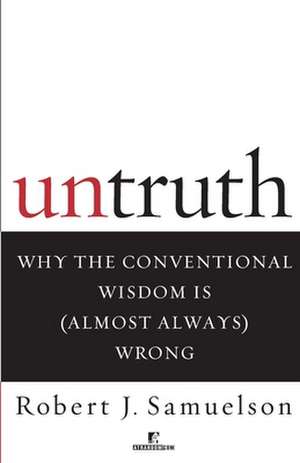Untruth: Ron Conway and the Fall of the Dot-Coms
Autor Robert J. Samuelsonen Limba Engleză Paperback – 28 feb 2001
Untruth is the first collection of Samuelson's insightful assaults on the conventional wisdom. Included are columns arguing that campaign contributions have not corrupted politics, that the "service economy" is not turning America into a nation of hamburger flippers, and that the Internet isn't the most important invention since the printing press.
Preț: 114.69 lei
Nou
Puncte Express: 172
Preț estimativ în valută:
21.95€ • 22.67$ • 18.27£
21.95€ • 22.67$ • 18.27£
Carte disponibilă
Livrare economică 05-19 martie
Preluare comenzi: 021 569.72.76
Specificații
ISBN-13: 9780812991642
ISBN-10: 0812991648
Pagini: 304
Dimensiuni: 155 x 217 x 21 mm
Greutate: 0.41 kg
Editura: ATRANDOM
ISBN-10: 0812991648
Pagini: 304
Dimensiuni: 155 x 217 x 21 mm
Greutate: 0.41 kg
Editura: ATRANDOM
Notă biografică
In addition to Newsweek and the Washington Post, Robert J. Samuelson's columns are syndicated to about 40 U.S. and 20 foreign papers by The Washington Post Writers Group. He is the author of The Good Life and Its Discontents: The American Dream in the Age of Entitlement, 1945-1995. He lives in Bethesda, Maryland with his wife, Judy Herr, and their three children, Ruth, Michael and John.
Extras
THE STEADFAST (AND OFTEN SILLY) AMERICAN CHARACTER
Every so often an item bounces across the Associated Press wire that reminds you how steadfast the American national character is. Here’s one (suitably abbreviated) that arrived a few weeks ago:
ROCHESTER, N.H.—An 88-year-old woman made good on her pledge not to pay “one red cent” of a court judgment against her for taking a neighbor boy’s kickball away. Rochester District Court Judge Franklin Jones accepted a check for $30.20 from someone who sympathized with Reba Martineau rather than pressing Martineau herself to pay. Jones could have jailed her for contempt. Martineau refused to return nine-year-old Gary Campbell’s kickball after it went into the yard of her home in a mobile home park in September. She claimed she and other elderly residents had been treated disrespectfully by neighborhood children. The boy’s parents filed a small claims lawsuit to get the ball or make her pay for it. After deducting its fees, the court will give the parents, Martha and Wayne Campbell, $9.99 for a new ball.
Wayne Campbell said they went to court to show their son the law cannot be broken.
Now, a lot of folks think the American national character is going to pot. Time magazine recently complained in a cover story that we have become a nation of “crybabies.” We sue too often. We see ourselves as the “victims” of someone or something else. The editors at Time ought to brush up on their history. What they (and many others) deplore is simply the good old American character adapting to modern times. We may not like what we see, but—as the kickball saga will show—it’s the way we’ve always been.
Americans have long lived by two propositions.
Proposition Number One: You’re no better than I am.
Equality is our religion, as Alexis de Tocqueville noted. We may not be equal in income, wealth, or talent. But we categorically reject the idea that people are automatically better or worse merely because they belong to some class or group. Tocqueville found that, unlike Europe, there was no natural aristocracy in America. Everyone is supposed to have the same opportunity. This was our national ideal (and mythology) in the 1830s. It remains so today.
Proposition Number Two: You can’t do that to me.
Since at least the Boston Tea Party, Americans have resented arbitrary authority. We have the Bill of Rights to define the limits of outside control over individual conduct. We react strongly against what we regard as intrusions into our lives, whether by government, bureaucracy (private and public), or other groups and individuals. Liberals defend “rights.” Conservatives exalt “freedom.” They’re really talking about the same thing.
Let it be said that these have been—and are—sources of American greatness. They nurture love of liberty, a respect for the individual, and a healthy sensitivity to the abuse of power. But these same impulses can get out of hand. Unless somehow tempered, they can lead to absurd and wasteful conflict.
In a more traditional society, Reba Martineau would have received some deference merely because she is 88. Not in America. The old aren’t superior simply because they’re old. We won’t have an aristocracy of age or anything else. After “Mama” and “dog,” American children first learn to say: “It’s not fair.” They think they’re as good as anyone else, and they’re encouraged to believe it. Gary Campbell’s parents went to court to show him that, before the law, he was equal to anyone.
What the quarrel was about was freedom and rights. Reba Martineau’s offense was that she meddled with Gary Campbell’s right to play kickball. Gary Campbell’s offense was that he threatened Reba Martineau’s right to live in peace and quiet. So they had to have a brawl over their respective rights—at society’s expense. Of the ultimate penalty ($30.20), only one-third ($9.99) went for the kickball, while two-thirds ($20.21) covered court costs.
This is a small parable for our larger predicament. Lawyers aren’t the only reason (or maybe even the main reason) for the litigiousness of American society. Yes, they encourage it, exploit it, and profit from it. But the basic driving forces lie deep in traditional American values. People or groups who feel they’ve been wronged or abused believe intensely that our system entitles them to retribution. The system is supposed to enforce equality. It is supposed to protect individual rights and freedoms.
What Time describes as “victimology”—the idea that your problems are always someone else’s fault—derives from the same values. They are a wellspring for economic, social, racial, sexual, and personal resentment. They provide a ready-made escape from individual responsibility. We’re all equal, right? Well, if we’re not, then why not? Who’s to blame? Every group of individuals that’s dissatisfied with life looks for the villain who stole the American dream.
These questions are often fair and legitimate. Social conditions constantly change. Our society is and always will be imperfect. It can’t improve itself if no one challenges the status quo. Nor is every lawsuit frivolous. But the trouble is that virtuous American values are increasingly unrestrained by custom, tradition, or common sense. In a bureaucratic and legalized society, there are many points for complaint and pressure. Television and print media provide ample opportunity for publicity and self-expression. Almost everyone can go somewhere to pout about something.
What has gotten us into trouble is the boundless belief in our own national rhetoric. Our virtues, when taken to excess, become vices. They breed self-pity, self-delusion, and pointless conflict. The old American character hasn’t died. It’s just grown a bit silly. Couldn’t someone have said: “Gary, apologize to Mrs. Martineau,” and “Reba, please give back the ball”?
The Washington Post
August 21, 1991
Every so often an item bounces across the Associated Press wire that reminds you how steadfast the American national character is. Here’s one (suitably abbreviated) that arrived a few weeks ago:
ROCHESTER, N.H.—An 88-year-old woman made good on her pledge not to pay “one red cent” of a court judgment against her for taking a neighbor boy’s kickball away. Rochester District Court Judge Franklin Jones accepted a check for $30.20 from someone who sympathized with Reba Martineau rather than pressing Martineau herself to pay. Jones could have jailed her for contempt. Martineau refused to return nine-year-old Gary Campbell’s kickball after it went into the yard of her home in a mobile home park in September. She claimed she and other elderly residents had been treated disrespectfully by neighborhood children. The boy’s parents filed a small claims lawsuit to get the ball or make her pay for it. After deducting its fees, the court will give the parents, Martha and Wayne Campbell, $9.99 for a new ball.
Wayne Campbell said they went to court to show their son the law cannot be broken.
Now, a lot of folks think the American national character is going to pot. Time magazine recently complained in a cover story that we have become a nation of “crybabies.” We sue too often. We see ourselves as the “victims” of someone or something else. The editors at Time ought to brush up on their history. What they (and many others) deplore is simply the good old American character adapting to modern times. We may not like what we see, but—as the kickball saga will show—it’s the way we’ve always been.
Americans have long lived by two propositions.
Proposition Number One: You’re no better than I am.
Equality is our religion, as Alexis de Tocqueville noted. We may not be equal in income, wealth, or talent. But we categorically reject the idea that people are automatically better or worse merely because they belong to some class or group. Tocqueville found that, unlike Europe, there was no natural aristocracy in America. Everyone is supposed to have the same opportunity. This was our national ideal (and mythology) in the 1830s. It remains so today.
Proposition Number Two: You can’t do that to me.
Since at least the Boston Tea Party, Americans have resented arbitrary authority. We have the Bill of Rights to define the limits of outside control over individual conduct. We react strongly against what we regard as intrusions into our lives, whether by government, bureaucracy (private and public), or other groups and individuals. Liberals defend “rights.” Conservatives exalt “freedom.” They’re really talking about the same thing.
Let it be said that these have been—and are—sources of American greatness. They nurture love of liberty, a respect for the individual, and a healthy sensitivity to the abuse of power. But these same impulses can get out of hand. Unless somehow tempered, they can lead to absurd and wasteful conflict.
In a more traditional society, Reba Martineau would have received some deference merely because she is 88. Not in America. The old aren’t superior simply because they’re old. We won’t have an aristocracy of age or anything else. After “Mama” and “dog,” American children first learn to say: “It’s not fair.” They think they’re as good as anyone else, and they’re encouraged to believe it. Gary Campbell’s parents went to court to show him that, before the law, he was equal to anyone.
What the quarrel was about was freedom and rights. Reba Martineau’s offense was that she meddled with Gary Campbell’s right to play kickball. Gary Campbell’s offense was that he threatened Reba Martineau’s right to live in peace and quiet. So they had to have a brawl over their respective rights—at society’s expense. Of the ultimate penalty ($30.20), only one-third ($9.99) went for the kickball, while two-thirds ($20.21) covered court costs.
This is a small parable for our larger predicament. Lawyers aren’t the only reason (or maybe even the main reason) for the litigiousness of American society. Yes, they encourage it, exploit it, and profit from it. But the basic driving forces lie deep in traditional American values. People or groups who feel they’ve been wronged or abused believe intensely that our system entitles them to retribution. The system is supposed to enforce equality. It is supposed to protect individual rights and freedoms.
What Time describes as “victimology”—the idea that your problems are always someone else’s fault—derives from the same values. They are a wellspring for economic, social, racial, sexual, and personal resentment. They provide a ready-made escape from individual responsibility. We’re all equal, right? Well, if we’re not, then why not? Who’s to blame? Every group of individuals that’s dissatisfied with life looks for the villain who stole the American dream.
These questions are often fair and legitimate. Social conditions constantly change. Our society is and always will be imperfect. It can’t improve itself if no one challenges the status quo. Nor is every lawsuit frivolous. But the trouble is that virtuous American values are increasingly unrestrained by custom, tradition, or common sense. In a bureaucratic and legalized society, there are many points for complaint and pressure. Television and print media provide ample opportunity for publicity and self-expression. Almost everyone can go somewhere to pout about something.
What has gotten us into trouble is the boundless belief in our own national rhetoric. Our virtues, when taken to excess, become vices. They breed self-pity, self-delusion, and pointless conflict. The old American character hasn’t died. It’s just grown a bit silly. Couldn’t someone have said: “Gary, apologize to Mrs. Martineau,” and “Reba, please give back the ball”?
The Washington Post
August 21, 1991
Textul de pe ultima copertă
In Untruth, Newsweek and Washington Post columnist Robert J. Samuelson explains why our political, economic, and cultural debates so routinely traffic in misinformation -- popular fads that, like meteors, momentarily burn brightly in public consciousness and then fizzle out. Advocacy groups, politicians, and their unwitting allies in the media instinctively create agendas of problems that afflict society and must be "solved". The problems are often exaggerated and oversimplified, and the result is that the public is misled about what is wrong and how easily it can be made right.
Untruth is the first collection of Samuelson's insightful assaults on the conventional wisdom. Included are columns arguing that campaign contributions have not corrupted politics, that the "service economy" is not turning America into a nation of hamburger flippers, and that the Internet isn't the most important invention since the printing press.











